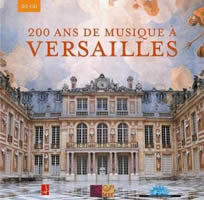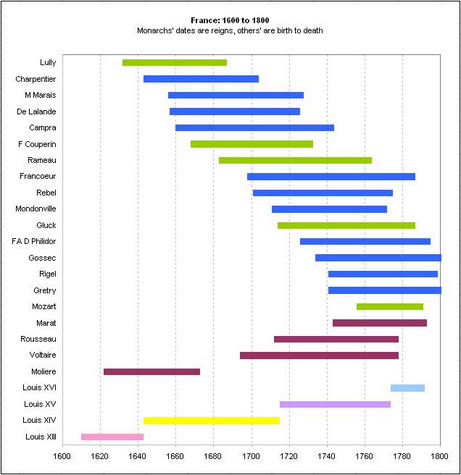200 Ans de Musique à Versailles
|
Grant Chu Covell [June 2011.]
“200 Ans de Musique à Versailles.” Var. Comps. Var. Works. Var. Perfs. MBF 1108 (20 CDs). Distributed in the US by Naxos (http://www.naxos.com/). This 20-disc set has occupied a shelf for quite some time. Originally released in France in 2007 (Premiere Music Distributors [http://classical.premieremusic.net/] carries the French edition, MBF 1107), an English-language set appeared via Naxos in 2008 (MBF 1108). A dedicated website vanished some time ago. The informationally-challenged English booklet’s notes provide movement titles, forces and texts. The French release apparently contains a 21st CD, a CD-ROM with notes. The English-language translation of composer biographies can be found on the Internet. The French Ministry of Culture asked Lully scholar Philippe Beaussant and musician Vincent Berthier de Lioncourt to create a center for the study of French Baroque music at Versailles. The Centre de Musique Baroque Versailles (http://www.cmbv.fr/), founded in 1987, celebrated its 20th birthday with this release among other events. Today the CMBV offers concerts, publishes music and sponsors research. While performance details are lacking in the English booklet, we know that all the 2007 concerts occurred between September 21 and October 21. A quick count reveals that all but two discs offer music from the CMBV’s 20th-anniversary season. Some selections come from prior years’ performances while others are borrowed wholesale from other labels. The 200 years can be navigated as a prelude with three acts. The booklet suggests a Prologue followed by an Apotheosis, Divertissement and Epilogue. Two discs cover music at the time of Louis XIII, small-scale intimate entertainments for voices supported by a few instruments, intermingled with solo harpsichord or lute pieces. A recital by Monique Zanetti (voice) and Claire Antonini (lute) suggests that Antoine Boësset was the exemplar of his time. The reigns of Louis XIV, Louis XV and Louis XVI each receive six discs. Louis XIV begins as it must with Lully, and Rameau’s operas introduce Louis XV.
Excerpts from three Lully operas, Isis, Amadis and Persée, anchor Louis XIV’s reign. Bits from Destouches’ Callirhoé, Colasse’s Achille et Polyxène, Marais’ Séméle, and Charpentier’s Médée provide contrasting balance. The Sun King heard music when he dined, and disc five offers dance music by Lalande and Lully fils along with two of Couperin’s Concerts royaux. Three discs of sacred music represent Versailles’ grand motets and music for less ostentatious surroundings: Lully and Charpentier’s Misereres, Charpentier’s Litanies de la Vierge and Messe des morts à quatre voix, Desmarest’s De profundis and Usquequo domine, etc. The Third of Couperin’s Leçons de Ténèbres is borrowed from William Christie’s Warner release. All the Rameau opera excerpts were recorded at Versailles. Hippolyte et Aricie extracts were retrieved from a 1994 performance led by Marc Minkowski released on DG. Selections from Les Tales Lyriques, Hippolyte et Aricie and Zoroastre involving Véronique Gens and Les Talens Lyriques under Christophe Rousset date from 2007. There are two complete single-disc operas: Rebel and Francoeur’s Zélindor, roi des Sylphes and François Colin de Blamont’s Égine. I was glad to hear so much Mondonville: Dominus regnavit, Nisi dominus and the Op. 3 sonatas which straddle the genres we now call “violin sonata” and “symphony,” here offered in symphonic guise. Other sacred music includes Campra’s Confitebor tibi domine and Rameau’s In covertendo, another Les Arts Florissants release courtesy of Warner/Erato. I was asked how one actually listens to such an anthology. The first 14 discs with fine performances from groups that specialize in this period will generally reinforce what we know and love about the French Baroque. Understandably, there was scant solo harpsichord music (some Chambonnières for Louis XIII) and only four tracks of organ music (Olivier Latry at the Versailles Royal Chapel), the emphasis being on Versailles’ grander operatic and sacred offerings. Disc 15 proved a shock. The preceding discs were predominantly if not exclusively Francophile. With Louis XVI, Versailles and France’s musical influences opened wide to Italy and Germany. The composers’ origins and musicians’ execution styles changed markedly. The delicate tapering and prevalent appoggiaturas are all gone now. It has been argued that French music suffered a decline as the Revolution approached. These confident and vibrant performances attempt to convince us otherwise. This essential collection reminds us why the French Baroque is so important and additionally offers a comprehensive look at the 18th century’s close. Louis XVI’s era commences with excerpts from operas by Antonio Sacchini and Niccolò Piccinini. Pre-Romantic native talent includes François-Joseph Gossec, François-André Danican Philidor and André Ernest Modeste Grétry. There is an operatic excerpt by Rodolphe Kreutzer, eponymous dedicatee of a favorite Beethoven violin sonata. Most discs exceed the hour mark; not disc 17, “The Rise of the French Symphony,” featuring Le Cercle de l’Harmonie under Jérémie Rhorer, which completes at 30:27 with the prelude from Gossec’s ballet Mirza and single symphonies by Simon Leduc and Henri-Joseph Rigel. Other Rigel includes the oratorio La sortie d’Egypte in which it startles to hear nascent Romanticism. Suddenly Gluck’s Parisian successes make sense as the contemporaneous French style yielded to an early international Classical style. It’s not too much of a strain to detect hints of Haydn, Weber or early Beethoven, but difficult to believe that Berlioz is only a few decades away. Those decisive guillotine strokes have yet to intervene. Andreas Staier’s 48-minute pianoforte program positions Mozart alongside Claude-Bénigne Balbastre and Hyacinthe Jadin. During his big Paris trip in 1778, Mozart wrote the A minor sonata, K. 310, and Symphony No. 31. A disc of quartets and quintets, some including flute (François Devienne, Pierre Vachon, Giuseppe Maria Cambini, Luigi Boccherini) reinforces the prevalent belief that music in France at the 18th century’s end was less inspired. The last disc opens with sacred motets but concludes with Latry at the organ. The final selection is Balbastre’s Marche des Marseillois et l’air Ça ira, a fitting and ironic end.
Balbastre, Charpentier, Colasse, Couperin, Desmarest, Destouches, Gossec, Gretry, Jadin, Lalande, Lully, Marais, Mondonville, Mozart, Philidor, Piccinini, Rameau, Rebel and Francoeur, Rigel, Sacchini
[More Grant Chu Covell]
[More
Balbastre, Charpentier, Colasse, Couperin, Desmarest, Destouches, Gossec, Gretry, Jadin, Lalande, Lully, Marais, Mondonville, Mozart, Philidor, Piccinini, Rameau, Rebel and Francoeur, Rigel, Sacchini]
[Previous Article:
Re: Duke redux]
[Next Article:
Random Noise 29]
|

